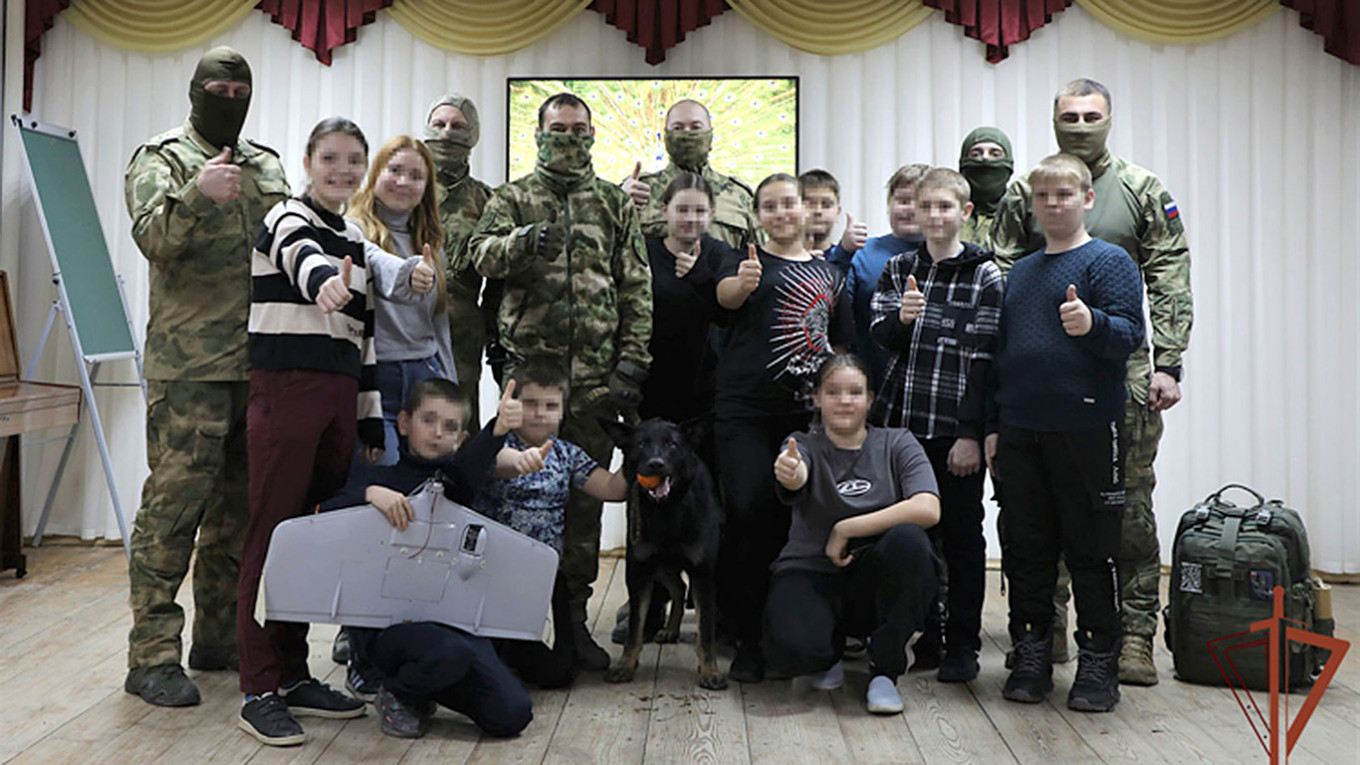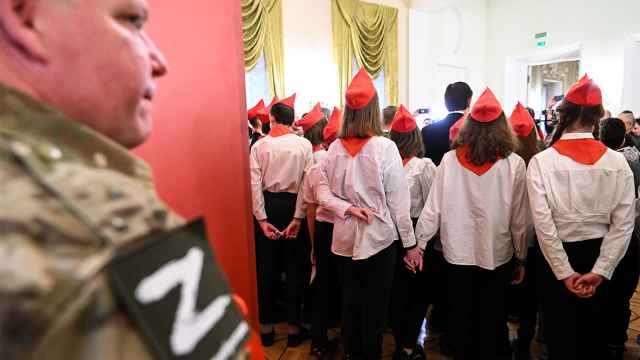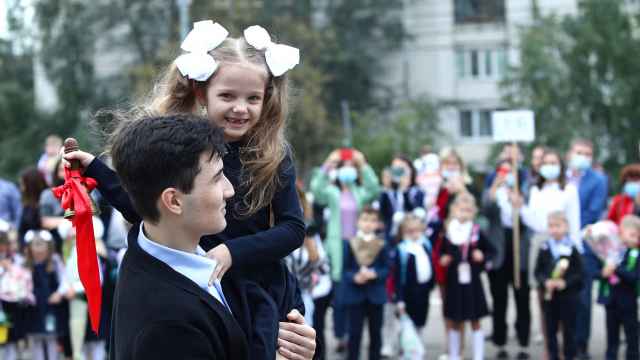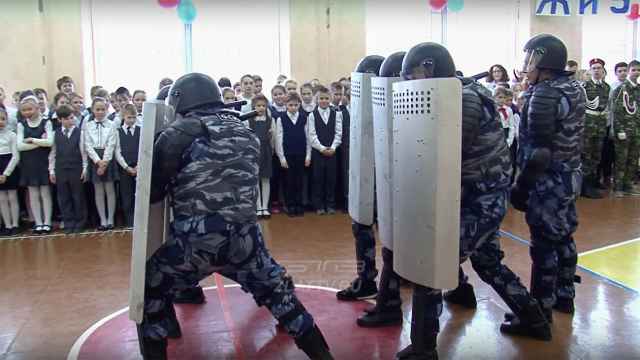“Down! And now this gesture will make the dog sit,” says a National Guard officer, his face half-covered by a balaclava, as he points at a German Shepherd. He stands in a school assembly hall in the Russian-occupied Kherson region. The dog obeys, and the children laugh.
The session is part of a professional training program run by the Russian National Guard, or Rosgvardia, held in schools in the occupied Donetsk, Luhansk, Zaporizhzhia and Kherson regions of Ukraine.
In addition to the service dog, officers showed students equipment, demonstrated tactical medicine and displayed a reconnaissance drone in action.
Since late February, Russian security forces have increasingly visited schools and colleges in the occupied territories of Ukraine.
Alongside lectures about the dangers of drugs or road safety, officers promote enrollment in military and law enforcement universities. They talk to youth about careers in the Interior Ministry, Federal Security Service (FSB), Federal Penitentiary Service (FSIN) and other agencies.
The occupying authorities refer to these events as “career guidance” or “informational sessions.”
“Students possessing strong willpower and high moral values can achieve great success in a noble career dedicated to upholding law and order in society,” FSIN officers from the Donetsk region said after one such school meeting.
During these events, teens learn about free education at law enforcement universities and the health and physical fitness requirements for applicants, as well as perks such as subsidized housing and other benefits.
“Security services have always seen schoolchildren and students as a recruiting pool,” Ivan Stupak, an adviser to Ukraine’s parliamentary committee on national security, told The Moscow Times.
“It’s much easier to walk into a school, flash your badge and ask the principal to bring out the most reliable students. Half the recruitment work is done for you right there,” he said.
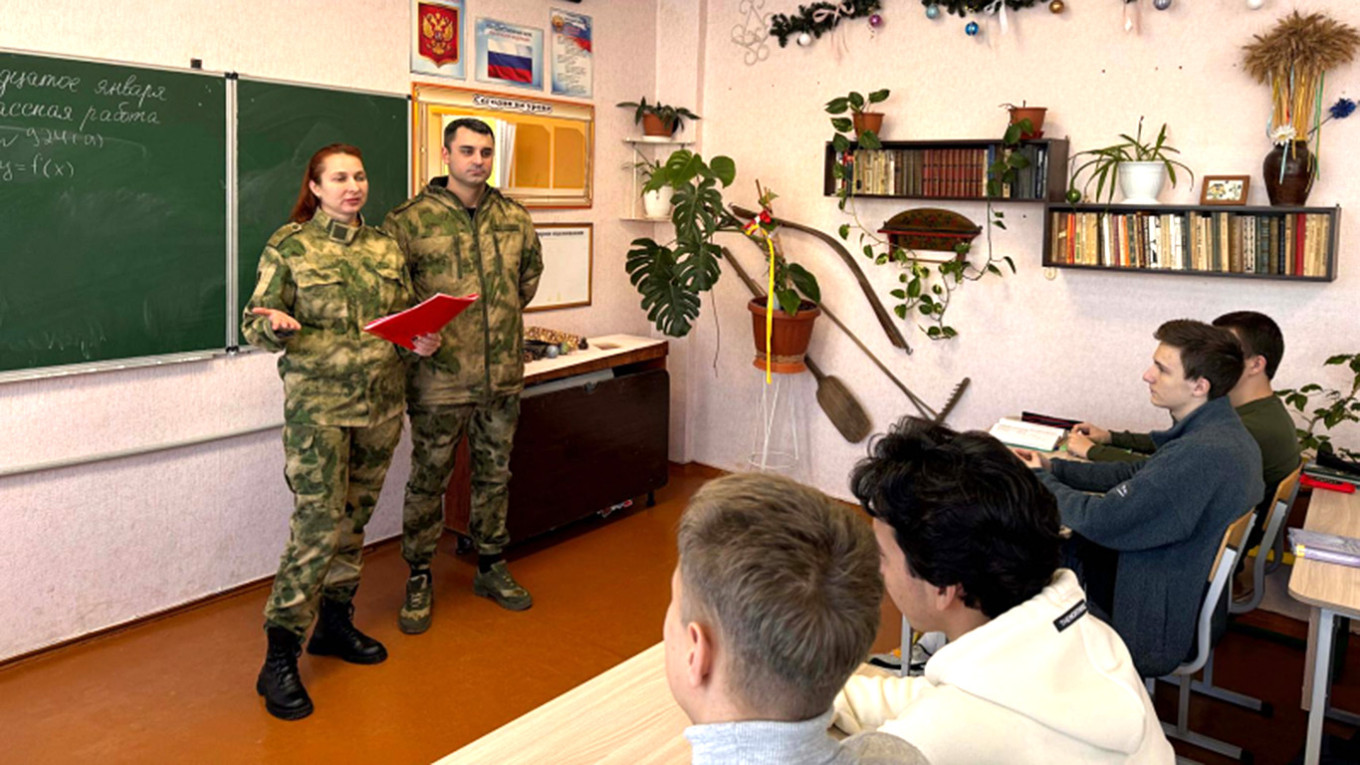
These recruitment drives come as Russia faces a growing shortage of law enforcement personnel. In March, Interior Minister Vladimir Kolokoltsev reported a shortfall of 172,000 officers, while FSIN said its staffing gap had reached 23%.
The FSIN shortfall has doubled since 2021, the year before Russia’s full-scale invasion of Ukraine.
According to estimates by the independent outlet IStories, salaries in key police roles are 1.7 to 2.5 times below the national average. For example, a local district officer earns about 49,000 rubles (approximately $568) per month.
For high schoolers, the emphasis is not on salaries, but on access to free education at security-related universities.
In winter, the Kherson branch of Russia's Interior Ministry launched a campaign called “Soldier of Law and Order.”
Officers visited not just high school students, but also younger children, tailoring their messages to the audience. While primary school students heard about the importance of attending school regularly, for older students, the emphasis was on criminal and administrative liability for extremism, terrorism and drug-related offenses.
In the occupied Ukrainian city of Melitopol, high school students assembled in the Emergency Situations Ministry headquarters to hear from staff about their work.
“This foray into the world of courage and bravery was not only educational, but inspired many to seriously consider this career path,” the ministry wrote on its official website. A similar session was organized for students in Russian-occupied Skadovsk.
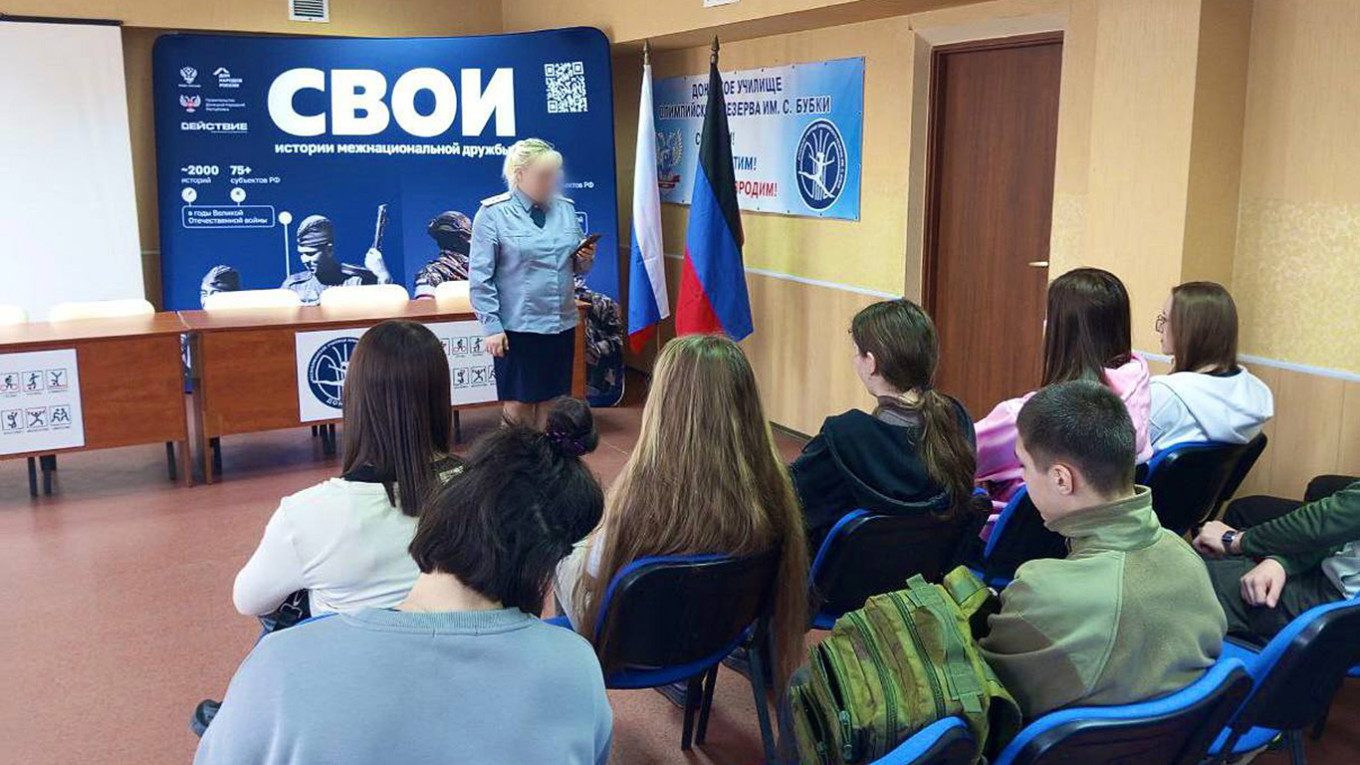
The influence of Russian security forces on schoolchildren goes beyond talks about police or National Guard service careers. In the fall of 2023 — a year and a half after Russia partially occupied the Zaporizhzhia region — the National Guard and Russian-installed education officials agreed to launch the region’s first specialized class affiliated with Rosgvardia.
A year later, 18 teenagers had enrolled in the National Guard class in occupied Berdiansk. They are receiving basic training in Russian security, “counter-terrorism protection” and pledging allegiance to security structures.
“Schools and universities are the easiest places to conduct initial screening,” Stupak said. “In schools, security officers can interact with individuals one-on-one — they already know which buttons to press, emotionally.”
Cadet classes became widely popular in Russia around 2018. Students typically begin in fifth or seventh grade, receiving military-style training alongside standard subjects. The curriculum includes drill practice, discipline and patriotic education. Russia’s security agencies — the army, police, the Emergency Situations Ministry or the National Guard — often supervise these classes.
“At a ceremonial assembly, the young national guardsmen were presented with special shoulder patches featuring the agency’s insignia,” the local security agency in Berdiansk reported.
According to state news agency TASS, there are currently 12 school classes in the occupied Zaporizhzhia region where students are enrolled in National Guard-linked programs.
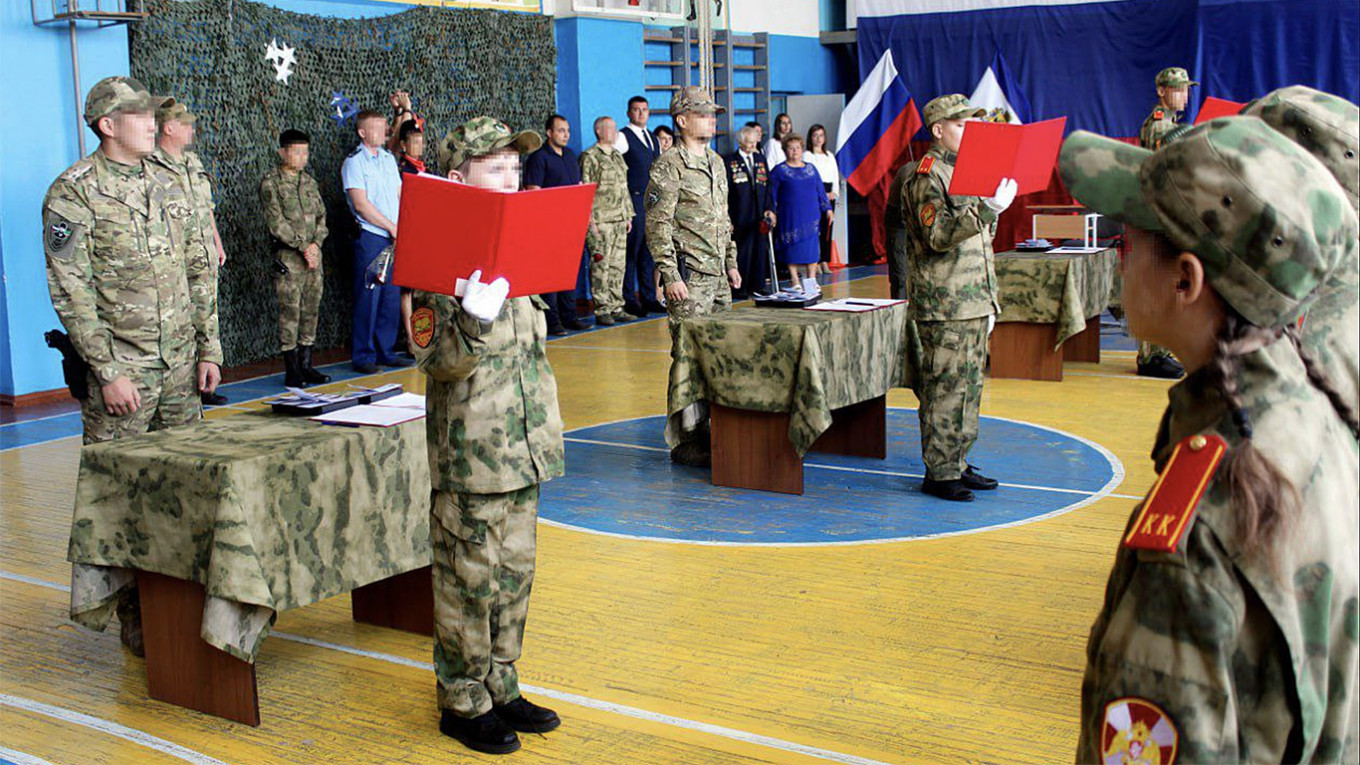
Last fall, School No. 2 in Syvash, Kherson region, launched a cadet class. Students arrived for lessons already dressed in camouflage uniforms.
“I am convinced that all the cadets who joined today will study diligently and wear this title with honor. In the future, they will devote their lives to serving our Motherland,” said the deputy head of the Kherson region’s Russian-installed National Guard office.
“Children are already training to use rifles, to shoot, to smell gunpowder. So when school ends, a graduate’s thought process is: ‘Well, I know how to shoot, I like running — maybe I should join the police or the FSB?’ In other words, they’re already tied to the security system,” said Stupak.
That initial enthusiasm for serving in law enforcement rarely lasts beyond five years, Stupak said.
“It takes three or four years just to adjust, to understand how the job works. Then something finally clicks — and their supervisor blocks the initiative. By year five, they realize there’s nothing interesting left. And for Ukraine, they’re already seen as traitors,” he said.
Alongside the growing network of cadet classes is another militarized youth movement active in the occupied territories: Yunarmiya, or the Youth Army.
Yunarmiya trains children from occupied areas to handle weapons and act as war correspondents. They learn to honor Russian soldiers in schools by naming “desks of heroes” after those fighting against Ukraine.
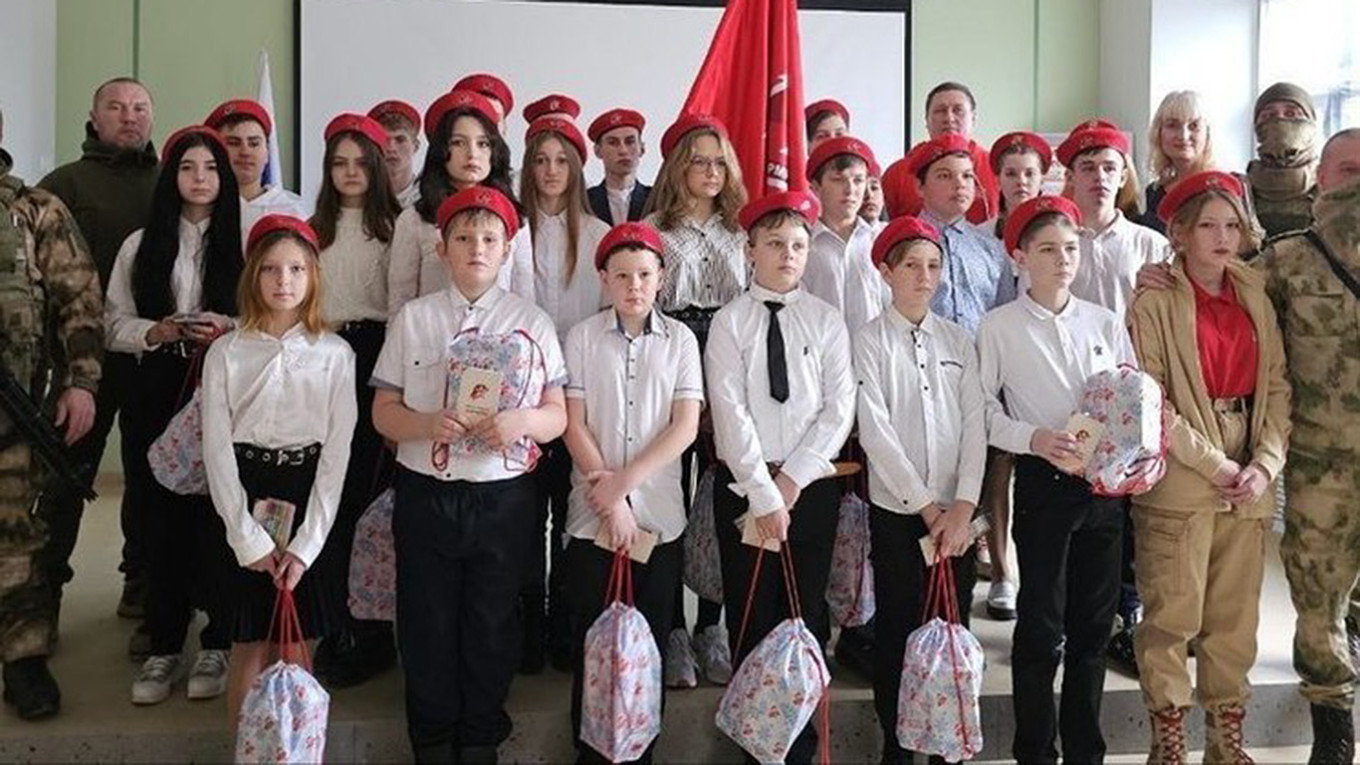
In November 2024, the U.K. imposed sanctions on current and former leaders of Yunarmiya in the Kherson region. Tatyana Zavalska, the head of a Kherson orphanage, was also sanctioned for her role in the forced transfer of 46 Ukrainian children for adoption in Russia.
Among the long-term consequences of indoctrinating teenagers, Stupak warns of a future where these youth could potentially take up arms against fellow Ukrainians.
“If Ukraine tries to retake these territories by force, it won’t be Russians fighting us. It will be our own people,” he said. “That’s the plan: so that it is not Russians who die, but their own people.”
A Message from The Moscow Times:
Dear readers,
We are facing unprecedented challenges. Russia's Prosecutor General's Office has designated The Moscow Times as an "undesirable" organization, criminalizing our work and putting our staff at risk of prosecution. This follows our earlier unjust labeling as a "foreign agent."
These actions are direct attempts to silence independent journalism in Russia. The authorities claim our work "discredits the decisions of the Russian leadership." We see things differently: we strive to provide accurate, unbiased reporting on Russia.
We, the journalists of The Moscow Times, refuse to be silenced. But to continue our work, we need your help.
Your support, no matter how small, makes a world of difference. If you can, please support us monthly starting from just $2. It's quick to set up, and every contribution makes a significant impact.
By supporting The Moscow Times, you're defending open, independent journalism in the face of repression. Thank you for standing with us.
Remind me later.


